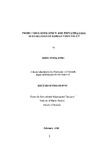Productive efficiency and privatisation : an evaluation of Korean ports policy
| dc.contributor.author | Song, Dong-Wook | |
| dc.contributor.other | Faculty of Science and Engineering | en_US |
| dc.date.accessioned | 2011-05-12T15:28:32Z | |
| dc.date.available | 2011-05-12T15:28:32Z | |
| dc.date.issued | 1999 | |
| dc.identifier | Not available | en_US |
| dc.identifier.uri | http://hdl.handle.net/10026.1/446 | |
| dc.description.abstract |
Korea has experienced remarkable economic growth during the last four decades due to its trade-oriented development policy. Since the international trade of Korea is carried predominantly by sea transport, its ports play a pivotal role in national economic development. This impressive development in a short period of time has resulted in rapidly increasing seaborne cargoes. All the parties involved in port activities have made a significant effort to keep pace with the ever-growing export and import cargoes. Korean ports, however, still have a number of problems including insufficient port and terminal capacity, inefficient management and operation, and bureaucratic administration, all of which weaken the competitiveness of the country's products by adding heavy logistics costs. Th deal appropriately with these problems, the newly established public port authority, the Ministry of Maritime Affairs and Fisheries, has launched a new port and terminal development plan to attract private capital into both existing and new facilities. As a consequence, this scheme has introduced new competition into the Korean port industry combined with some degree of privatisation. The motives for privatisation are complex and varied, but one key claim made is that the transformation of ownership from public to private improves economic efficiency. Economic theories and existing empirical studies, however, fail to establish clear-cut evidence supporting this claim. This phenomenon may reflect, to some extent, a paucity of performance indicators systematically applicable across enterprises and industries. It is essential, therefore, to have a systematic and pragmatic analytical framework to assess the process of privatisation and its results. With this context in mind, this thesis aims to critically review the characteristics of international port privatisation together with the economic theory of privatisation, to apply a new econometric technique for efficiency measurement to a port: the frontier model, and to assess the policy implications for the Korean government and port authority, paying particular reference to the privatisation strategy and its implementation within the nation's seaports and terminals. This research makes an original contribution to knowledge in three respects: firstly, port privatisation, in particular the Korean case has, for the first time, been scientifically investigated on the basis of the economic theory of privatisation; secondly, the industry was analysed through the application of a recently developed econometric efficiency measurement method based on the estimation of two frontier models (i.e. cross-sectional and panel models); and finally, the results of the research undoubtedly provide government, port authority and other interested parties with information and guidelines for implementing the policy of port privatisation. | en_US |
| dc.language.iso | en | en_US |
| dc.publisher | University of Plymouth | en_US |
| dc.subject | Commerce | |
| dc.subject | Privatisation | |
| dc.subject | Korea | |
| dc.subject | Ports | |
| dc.subject | Internal and EU commerce & consumer affairs | en_US |
| dc.title | Productive efficiency and privatisation : an evaluation of Korean ports policy | en_US |
| dc.type | Thesis | |
| dc.identifier.doi | http://dx.doi.org/10.24382/4858 |
Files in this item
This item appears in the following Collection(s)
-
01 Research Theses Main Collection
Research Theses Main


